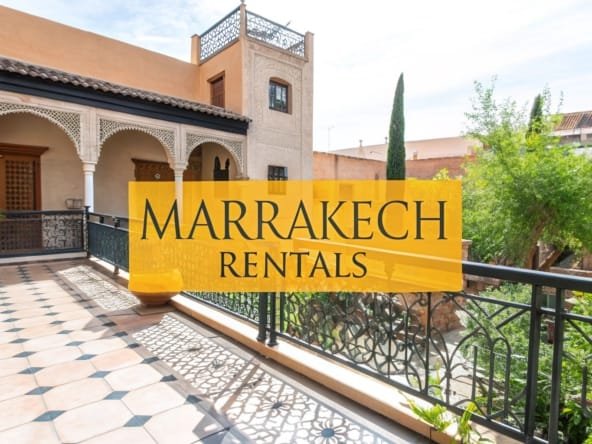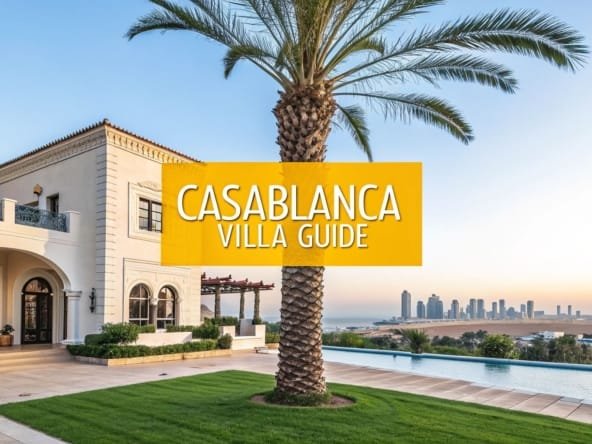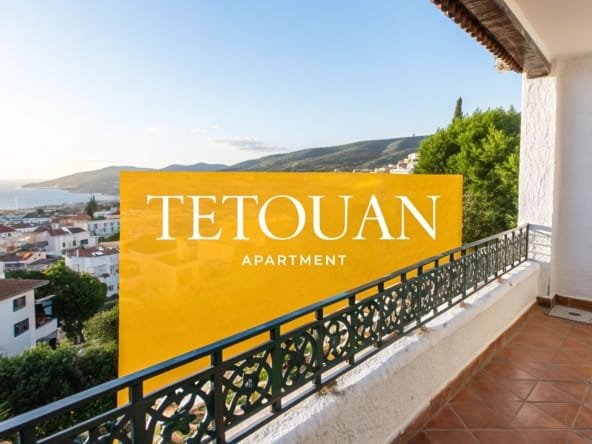Picture this: waking up to the vibrant, electric energy of Marrakech, a city where ancient tradition and modern luxury live side-by-side. This isn't just a daydream; it's a remarkably shrewd investment. To acheter un appartement à marrakech is to claim your own piece of a culturally rich, thriving city that delivers both an incredible lifestyle and strong financial returns.
Why Invest in a Marrakech Apartment?
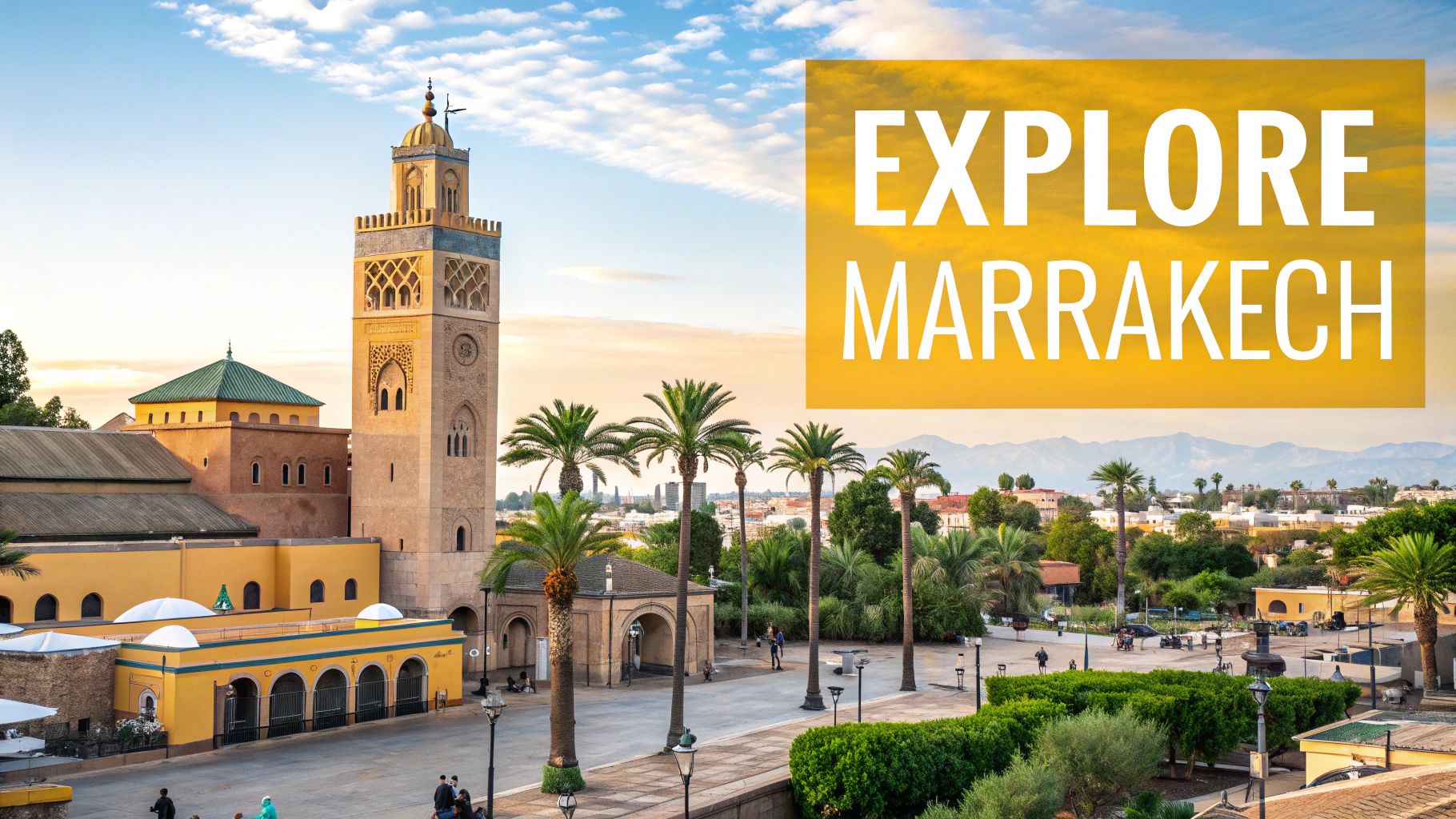
Marrakech holds a unique appeal for property investors and those simply seeking a better quality of life. The city has cemented its place as a top-tier global destination, drawing a steady flow of tourists, expats, and retirees year after year. This constant demand fuels a robust and surprisingly resilient real estate market, making it a fantastic choice whether you're looking for a personal getaway or a rental goldmine.
But the city's charm goes far beyond its famous souks and hidden riads. You'll find modern infrastructure, world-class golf courses, high-end shopping, and an international airport that puts major European hubs just a short flight away. It’s this seamless blend of authentic Moroccan character and contemporary convenience that creates a living experience few other places can offer.
A Stable and Growing Market
When you invest here, you’re not just buying property; you're buying into a market with a solid history of stability and growth. The "Red City" is a hotspot for real estate, especially in the luxury sector where developers are creating stunning high-end villas and modern apartment complexes that cater directly to an international clientele. The market shows consistent, steady appreciation.
As a snapshot, average apartment prices are currently around 13,000 MAD per square metre, a modest but encouraging uptick from last year. This growth is directly supported by Marrakech’s status as a tourism powerhouse. It continuously attracts new development in sought-after areas like Hivernage and Guéliz, pointing towards solid medium-term value increases.
The decision to buy property in Marrakech is more than a financial transaction; it's an investment in a lifestyle. It’s about owning a retreat where you can escape, recharge, and generate income simultaneously.
The Dual Benefit of Lifestyle and Income
One of the biggest draws of owning an apartment in Marrakech is the chance for a double return. On one hand, you get a personal holiday home in one of the world's most captivating cities. On the other, you can tap into an incredibly lucrative short-term rental market.
The city’s year-round tourism season means there's a constant demand for high-quality places to stay. This guide is built to give you the insider knowledge you need to navigate this journey, from finding the perfect neighbourhood to handling the final legal details. You can also explore the top reasons to invest in Marrakech real estate in 2024 for a deeper dive.
Finding Your Ideal Marrakech Neighbourhood
Choosing where to buy an apartment in Marrakech isn't just a line item on a checklist; it's about deciding what your life here will look and feel like. Marrakech isn’t one-size-fits-all. It's a mosaic of vibrant neighbourhoods, each with its own distinct personality, pace of life, and investment profile. Where you buy will dictate your daily routines, your social scene, and ultimately, the return on your investment.
To do this right, you need to look past the postcard descriptions. Sure, the historic Medina offers an intoxicating dive into Moroccan culture with its winding alleyways and ancient riads. But it’s a world apart from the cosmopolitan energy of Guéliz, with its chic cafés, modern art galleries, and wide, European-style avenues. Getting a feel for these fundamental differences is the first real step in finding your perfect spot.
The Modern Heart: Guéliz and Hivernage
If you're drawn to the convenience and buzz of city life, Guéliz is almost certainly where you'll start your search. This is the contemporary soul of Marrakech. Here, you'll find international brands, top-tier restaurants, and a dynamic, urban vibe. Apartments in Guéliz are a magnet for professionals and expatriates who value having everything—from co-working spaces to bustling nightlife—just a short walk away.
Right next door is Hivernage, which offers a similar central location but with the volume turned down. It's a bit more refined and noticeably quieter. Known for its luxury hotels, lush, tree-lined streets, and elegant apartment buildings, Hivernage is perfect if you want a prestigious address that feels residential but is still steps from the action. Both neighbourhoods are smart buys, with consistently high demand for rentals.
A neighbourhood isn't just a location; it's the backdrop to your life in Marrakech. Consider how you want to spend your days. Do you see yourself sipping coffee at a trendy café in Guéliz or enjoying the tranquillity of a private garden in the Palmeraie?
The Tranquil Oasis: The Palmeraie
For those whose Moroccan dream involves sprawling gardens, sparkling pools, and a permanent holiday atmosphere, the Palmeraie is the answer. This vast palm grove on the edge of the city is an exclusive enclave of luxury villas, five-star hotels, and secure residential complexes with incredible amenities. It's a true escape from the hustle and bustle of the city centre.
While it feels a world away, the Palmeraie is still well-connected. It’s an ideal choice for buyers seeking a second home or an investment property focused on a lifestyle of peace and privacy. Think golf courses, spas, and 24/7 security. An investment here is an investment in exclusivity.
Comparing Key Neighbourhoods
To make a truly informed choice, it helps to see how these areas compare financially. Below is a table that breaks down the key differences between popular neighbourhoods, giving you a clearer picture of what your budget can get you and what kind of lifestyle to expect.
Marrakech Neighborhood Comparison for Apartment Buyers
| Neighborhood | Average Price (MAD/m²) | Lifestyle Vibe | Best For | Investment Potential |
|---|---|---|---|---|
| Guéliz | 18,000 – 25,000 | Modern, bustling, cosmopolitan | Expats, professionals, urbanites | High rental demand, strong capital appreciation |
| Hivernage | 17,000 – 24,000 | Upscale, chic, tranquil | Luxury seekers, those wanting quiet centrality | Strong long-term and short-term rental potential |
| Palmeraie | 14,000 – 20,000 | Resort-like, private, serene | Holiday homeowners, families, golfers | Excellent for high-end holiday lets and a luxury lifestyle |
| Medina | 10,000 – 18,000 | Historic, authentic, vibrant | Culture enthusiasts, traditional property lovers | Unique rental opportunities (Riads), niche market |
This comparison highlights that each neighbourhood offers a distinct value proposition. Your final decision will come down to balancing your personal lifestyle preferences with your long-term financial goals.
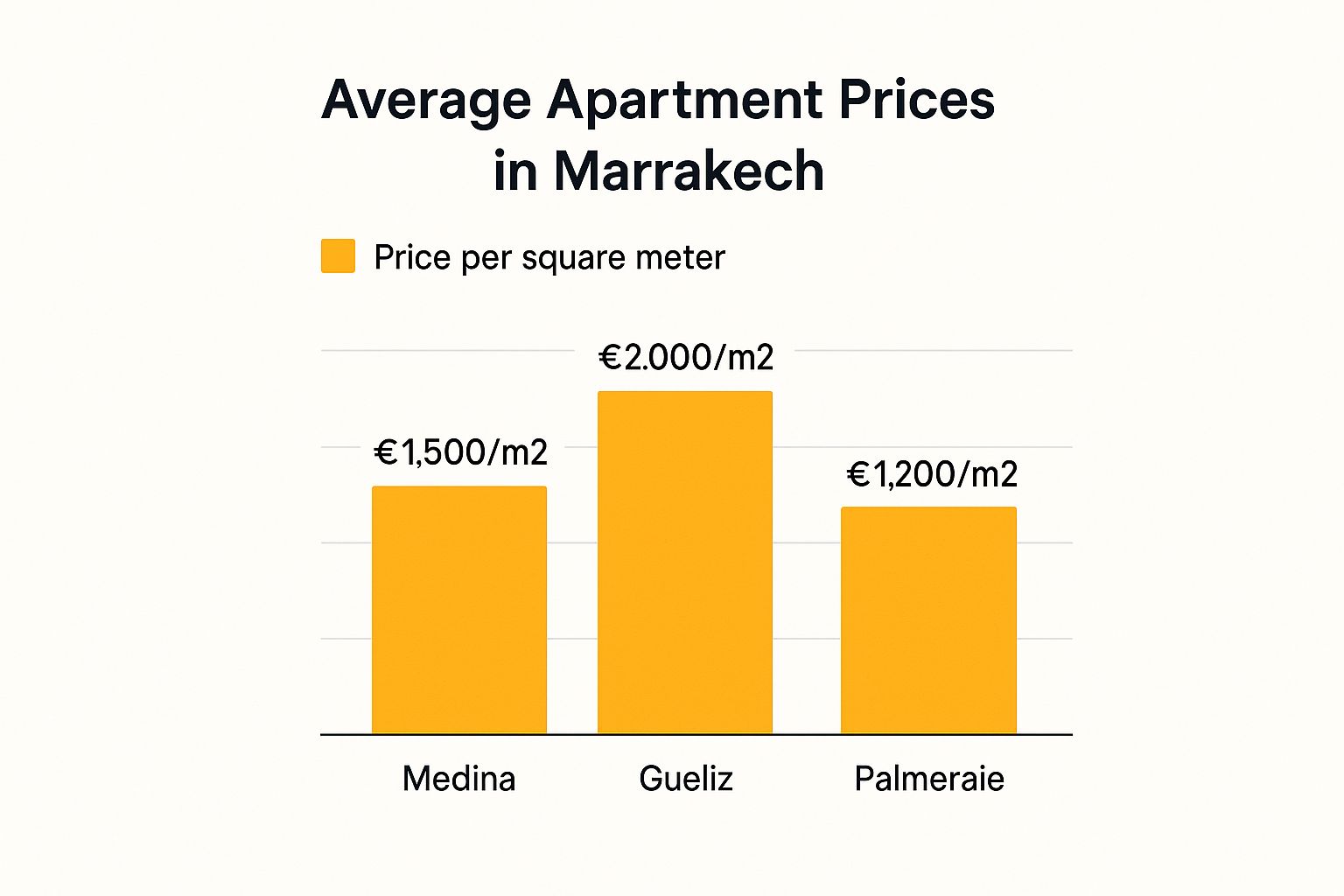
As the infographic shows, Guéliz often has the highest price per square metre, a direct reflection of its status as the city's modern commercial core. The Palmeraie, in contrast, tends to offer more space for your money, making it a compelling option for those who prioritise a resort-style environment over being in the middle of everything.
Ultimately, choosing the right neighbourhood requires a careful balance of your budget, what you want from your day-to-day life, and your investment ambitions. To dive even deeper into what each area has to offer, take a look at our complete guide to the top neighborhoods to buy your perfect home in Marrakech. It’s packed with the insights you need to make your final decision with confidence.
Understanding Moroccan Property Law for Foreigners
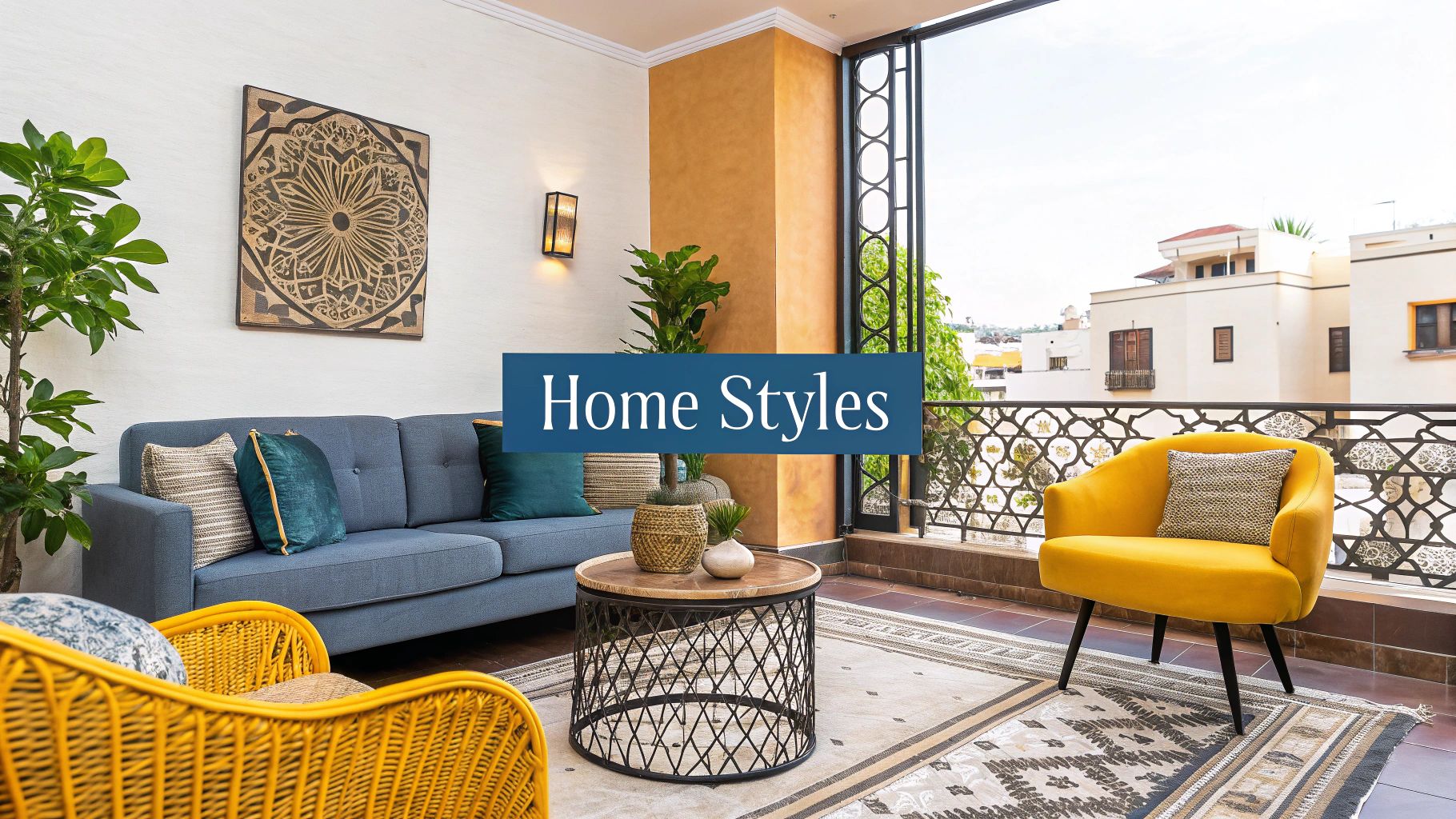
Let’s be honest, navigating the legal side of things is often the most intimidating part of buying property abroad. But here’s the good news: when you decide to acheter un appartement à Marrakech, you’ll find that Moroccan property law is surprisingly straightforward and built to protect your investment.
Morocco actively encourages foreign buyers, and as a non-resident, you have the same rights to own urban property as any Moroccan citizen. The entire system is built on a foundation of clear, registered ownership. Understanding this framework from the outset isn’t just reassuring—it empowers you to move forward with complete confidence.
The Gold Standard of Ownership: Titre Foncier
In Morocco, one term stands above all others when it comes to property: the Titre Foncier, or freehold title. Think of it as the ultimate, unshakeable proof of ownership for your apartment.
This isn't just a piece of paper; it's a definitive legal title registered with the national land registry, the Agence Nationale de la Conservation Foncière, du Cadastre et de la Cartographie (ANCFCC). When a property has a Titre Foncier, it means the state has thoroughly verified its boundaries, ownership history, and legal status.
Essentially, any property with this title is considered legally “cleansed”—free from old claims, boundary squabbles, or hidden debts. For any foreign buyer, this is non-negotiable. It’s the single most important element guaranteeing the security of your investment. We consider it so vital that we've detailed everything you need to know about the importance of the Titre Foncier in a separate guide.
The Central Role of the Notaire
In the Moroccan property world, the notaire (notary) is far more than just a lawyer who stamps documents. They are a public official, appointed by the King, who acts as a neutral, third-party guarantor for the entire transaction. Their core duty is to ensure the process is legal, secure, and fair for both you and the seller.
Here's what your chosen notaire will handle on your behalf:
- Verifying the Title: They’ll dive deep into the land registry records to confirm the seller is the true owner and that the Titre Foncier is clean of any mortgages, liens, or legal disputes.
- Drafting the Contracts: From the initial sales agreement (compromis de vente) to the final deed (acte de vente), the notaire drafts every legal document to ensure it’s ironclad and accurately reflects your agreement.
- Securing the Finances: The notaire holds your deposit in a protected escrow account and manages the final transfer of funds when you sign the deed.
- Registering Your Ownership: After the ink is dry, they officially register the new deed with the ANCFCC, which is the final step in transferring the Titre Foncier into your name.
Picking a good, independent notaire is one of the most critical decisions you'll make. They are your legal shield, making sure every detail is handled correctly and your rights are protected from start to finish.
Key Legal Stages of Your Purchase
The journey to owning your apartment follows a well-defined legal path. While your agent and notaire will guide you at every turn, having a clear picture of these milestones helps you know exactly what’s happening and what to expect next.
1. The Compromis de Vente (Preliminary Sales Agreement)
Once your offer is accepted, the first formal step is signing the compromis de vente. This is a legally binding contract that lays out all the terms: the agreed price, property details, completion date, and any special conditions (clauses suspensives), like making the sale contingent on securing a mortgage. You'll also pay a deposit, usually between 5-10% of the purchase price, which the notaire holds securely.
2. Due Diligence and Final Checks
The period between signing the compromis and the final deed, typically 30 to 60 days, is when your notaire gets to work. This is the due diligence phase, where they double-check everything—confirming the title is clear, verifying building permits, and ensuring there are no outstanding property taxes or syndic (homeowner association) fees.
3. The Acte de Vente (Final Deed of Sale)
This is the moment it all becomes real. You, the seller, and the notaire will meet to sign the acte de vente. Before you sign, you’ll need to have transferred the remaining balance of the purchase price, plus all taxes and fees, to the notaire's escrow account. Once signed, the notaire registers the sale, the title is transferred to your name, and you get the keys to your new home in Marrakech.
Sorting Out Your Finances and Budgeting
Turning the dream of owning a Marrakech apartment into a reality starts with a solid financial plan. Before you even begin browsing listings, you need a clear picture of how you'll fund the purchase and what the true cost will be. While many international buyers come to the table with cash, getting a mortgage from a Moroccan bank is absolutely possible, even if you’re not a resident.
Of course, local banks are understandably cautious when lending to foreign nationals. You should expect stricter requirements. Be prepared to put down a significant deposit, usually somewhere between 30% and 50% of the property’s value. They’ll also take a close look at your income stability and any existing financial commitments back in your home country.
Your First Move: The Convertible Dirham Account
Before a single dollar, pound, or euro is transferred, your first practical step is to open a convertible Dirham (MAD) bank account in Morocco. This isn't just a helpful tip; it's a non-negotiable for any foreign property buyer.
This special account is designed to let you bring in foreign currency and have it converted to Dirhams for your purchase. The real magic, however, happens down the line. When you eventually sell, this account is your golden ticket to legally repatriate your initial investment and any profits back home, sidestepping a world of bureaucratic headaches.
Think of the convertible Dirham account as your financial passport for Moroccan real estate. It creates a clean, official paper trail for your investment, which is absolutely vital for getting your money out later.
Getting one set up is fairly simple. Pop into any major Moroccan bank with your passport and proof of address from home, and they'll get you sorted.
Budgeting Beyond the Sticker Price
It’s an easy mistake to make: focusing only on the asking price when you plan to acheter un appartement à Marrakech. The number on the listing is just the starting point. To avoid any nasty surprises, a smart rule of thumb is to budget an extra 8% to 10% of the purchase price to cover all the associated taxes and professional fees.
Here’s a rough breakdown of where that extra money goes:
- Registration Tax: This is the big one, calculated at 4% of the purchase price.
- Land Registry Fee (Conservation Foncière): Expect this to be around 1.5% of the price, plus a few small fixed charges.
- Notary Fees (Honoraires du Notaire): The notary’s fee typically hovers around 1% of the property value, plus a 20% VAT on top of their fee.
- Agency Commission: If you're using a real estate agent, their fee is usually 2.5% from the buyer and 2.5% from the seller (plus VAT).
A Good Time to Invest?
Right now, the financial climate in Marrakech looks quite promising for buyers. Residential property prices have been demonstrating steady, healthy growth, ticking up by a modest 3% year-over-year. When you account for inflation, that's a real increase of 2.1%.
This kind of stability, paired with some of the lowest interest rates Morocco has seen in years, creates a particularly attractive window of opportunity. With fixed mortgage rates starting from 4.20%, the cost of borrowing is more manageable, making it a great time to lock in a loan and secure your investment. You can dig deeper into Moroccan property price trends on Global Property Guide for more detailed analysis.
Finding Your Apartment and Sealing the Deal
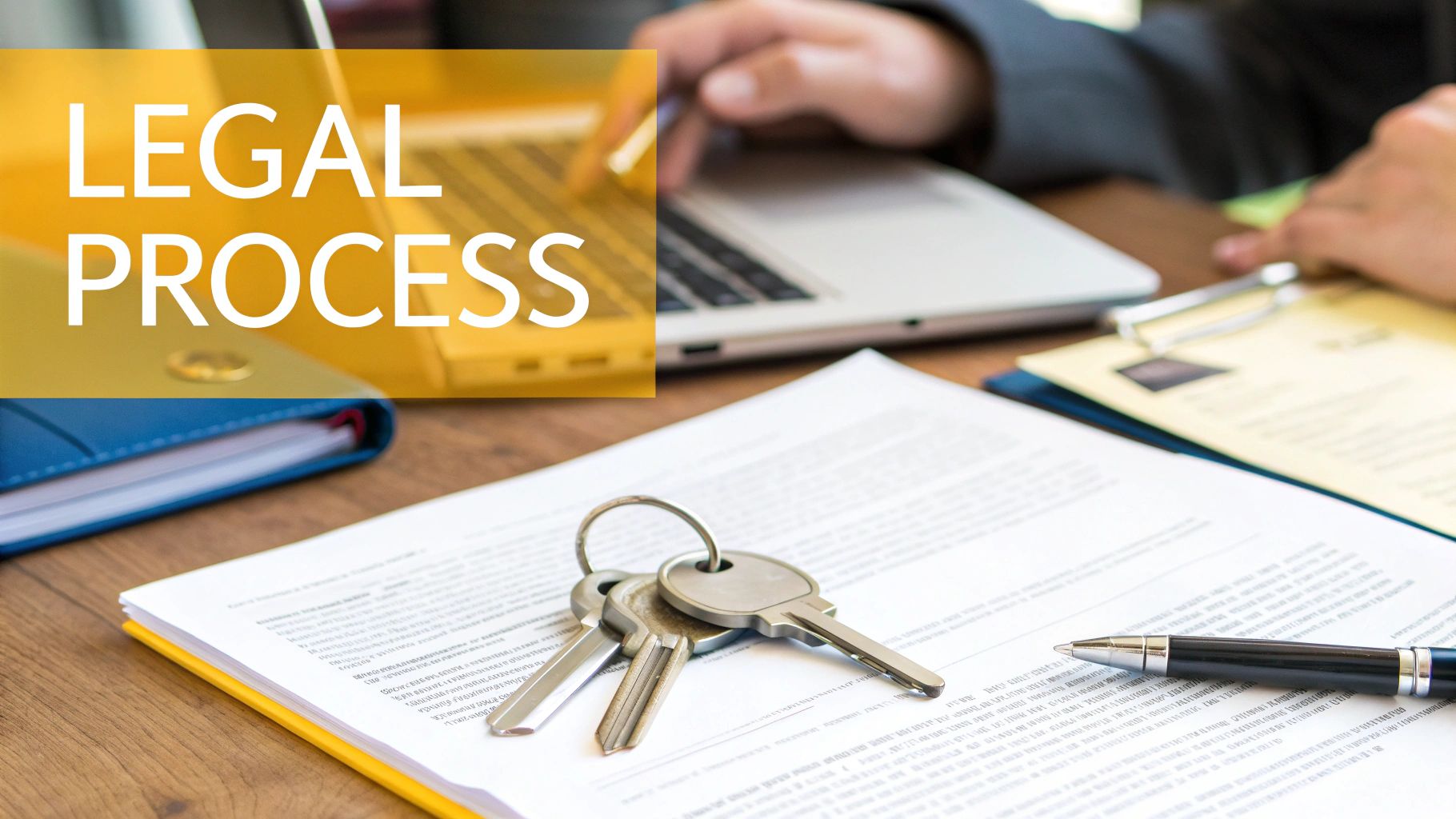
With your financing sorted and a solid grasp of the legal landscape, this is where the real fun begins. You're ready to start the active search to acheter un appartement à Marrakech, turning your research into reality.
This is the part of the journey where you'll be viewing properties, negotiating terms, and finally, signing the papers that make you a homeowner in the Red City. It’s an exciting time, and being prepared will make all the difference.
Why You Need a Good Local Agent
Sure, you can browse listings online, but teaming up with a reputable local agent immobilier (real estate agent) is one of the smartest moves you can make. A great agent is so much more than a salesperson; they are your guide, your cultural translator, and your biggest advocate on the ground.
They have access to properties that never hit the public market and an insider's understanding of what things are really worth. When you're choosing an agent, look for one with a physical office who is upfront about their commission. A true professional will want to understand your lifestyle and goals, not just your budget.
Getting the Most Out of Property Viewings
When you step inside a potential apartment, it’s easy to get swept away by a stunning terrace view or intricate tilework. But a viewing is your chance to play detective. You need to look past the beautiful staging and assess the property with a critical eye.
Come prepared with a sharp list of questions. It signals to the seller you're a serious buyer and ensures you walk away with the details you need to make a smart decision.
Here are a few things I always recommend asking:
- About the Building: "How old is the building? Have there been any recent major works, like to the roof or plumbing?"
- About the Fees: "What are the monthly syndic (homeowner association) fees, and can I see a breakdown of what they cover?"
- About the Neighbours: "What's the community like here? Is it mostly owners, or are many apartments used for short-term holiday lets?"
- About the Utilities: "Any known issues with the water pressure or the electrics in this apartment or the building in general?"
Don't be timid during viewings. Turn on the taps, flick the light switches, open the windows. Checking these simple things firsthand can save you a world of trouble down the line. It's much better to spot a problem now than after you've moved in.
The Art of a Marrakech Negotiation
In Marrakech, negotiation isn't just common; it's expected. It's a core part of the property buying process. This is a market built on relationships, so a respectful, well-researched approach will always beat an aggressive lowball offer.
Your agent can pull sales data for comparable properties to help you formulate a sensible opening offer. Factor in any immediate repairs or renovations you’ll need to do. It’s a bit of a dance—you want the best price, but you don't want to offend the seller and close the door on the deal. Know your absolute limit before you even start the conversation.
Once a price is agreed upon, it's all put down in writing in a compromis de vente. This is the preliminary sales agreement that locks in the price and terms, making your handshake deal legally binding.
Closing Day: Getting the Keys in Your Hand
The final piece of the puzzle is the signing of the acte de vente (the final deed) at the notaire's office. It’s a formal affair with you, the seller, and the notary all present. Before this meeting, you will have already transferred the outstanding balance and all the fees into the notary's secure escrow account.
The notary will read the deed aloud, confirming all the details are correct. Once everyone has signed, the deal is done. The notary then registers the sale with the land registry, and the seller hands over the keys. That moment—unlocking the door to your very own place in Marrakech for the first time—is one you won't forget.
After the Purchase: Settling In
Your journey isn't quite over when you get the keys. The first practical steps are setting up utilities like water and electricity in your name and formally introducing yourself to the building's syndic. Getting to know the building's rules and payment schedule is key to a hassle-free experience. This is the final step that officially transitions you from buyer to resident, and your new life in Marrakech can truly begin.
Common Questions About Buying in Marrakech
Even with the best roadmap, a few questions always pop up when you’re serious about buying an apartment in Marrakech. I've been through this process with countless clients, and the same queries tend to surface. Let's tackle them head-on to clear up any lingering doubts you might have.
This is your go-to guide for those final "what if" moments. Think of it as the last piece of the puzzle, giving you the clarity and confidence to move forward successfully.
Can I Get Residency by Buying Property?
This is easily the most frequent—and important—question I hear. The short answer is no, buying property in Morocco doesn't automatically grant you residency.
Foreigners are absolutely welcome to own freehold property (Titre Foncier) in urban areas like Marrakech. However, the purchase itself is separate from the residency permit (carte de séjour).
But here’s the crucial part: owning an apartment significantly boosts your residency application. It acts as powerful evidence of your commitment and ties to the country. When you apply, you'll still need to prove you have stable financial means to support yourself without working in Morocco. The property just makes your case much, much stronger.
Expert Tip: Don't try to navigate this alone. The rules can change. I always advise my clients to speak with a Moroccan immigration lawyer. They'll give you advice tailored to your situation and walk you through the most current application process for the carte de séjour.
What Are the Annual Ownership Costs?
The purchase price is just the beginning. To be a savvy owner, you need to budget for the annual running costs that come with your Marrakech apartment. These are quite predictable, but you need to account for them.
Here's what to expect:
- Property Taxes: Every owner pays an annual property tax. It’s called the taxe d'habitation for a primary home and the taxe de services communaux for a second home or rental. The amount is based on the property’s assessed rental value.
- Syndic Fees: Just about every apartment building has a homeowner's association, or syndic. These monthly or quarterly fees cover the upkeep of shared spaces—the lobby, gardens, pool, security, and general building maintenance.
- Utilities and Insurance: Don't forget the basics. You'll have monthly bills for water and electricity, and it's essential to have a good home insurance policy to protect your asset.
And if you're planning to rent out your place, remember you’ll need to declare that rental income and pay tax on it annually.
How Do I Find a Reliable Agent and Notary?
Getting this right is probably the most important part of the entire journey. Your real estate agent and your notaire (notary) are your local team, your advocates on the ground. You need to trust them implicitly.
In Marrakech, reputation is everything. The best way to start is by asking for recommendations. Talk to other expats or foreign property owners—you can find them in online forums and community groups. People are usually very open about who they had a good experience with and, just as importantly, who to avoid.
When you're checking out an agent (agent immobilier), make sure they're licensed and have a real, physical office. A true professional will be upfront about their commission (honoraires) from day one. For the notaire, it’s vital to choose someone independent, not one who works exclusively for the seller or developer. A good trick is to check with your home country's consulate in Morocco; they often keep a list of legal professionals who have experience with foreign buyers. Take the time to meet a few people before you decide.
At Rich Lion Properties, we know that buying a property in a new country can feel complex. Our experienced team is here to simplify every step, from finding the perfect apartment to navigating the legal process with ease. We provide the local expertise and dedicated support you need to invest in Marrakech with total peace of mind. https://richlionproperties.com

